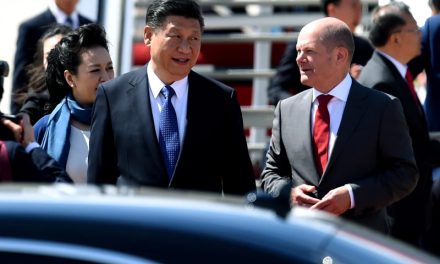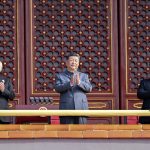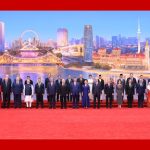BY BRADLEY A. THAYER AND LIANCHAO HAN
With Joe Biden’s election, appeals for U.S. accommodation of the People’s Republic of China are likely to be prominent. But accommodation will fail if the intent of such policies is to appease China’s ambitions and end or reduce the Chinese Communist Party’s (CCP) motivation to transform global politics through coercive measures, including threats or conflict.
As it has for decades, the CCP will continue to make appeals for accommodation, for turning away from President Trump’s policies, and for Western elites to reduce balancing against China. But despite China’s apparent warm embrace, it is only a matter of time before accommodation fails. It is temporary, at best, because actual accommodation would require China to forsake or delay its objectives.
The U.S. foreign policy elite should recognize that Party Chairman Xi Jinping is determined to be the equal of Mao Zedong in his impact on the CCP and the country, and to overshadow Deng Xiaoping’s legacy. Xi will ensure the supremacy of the party and its rule. He will advance and force Maoist ideological conformity. He will continue to target rivals or potential rivals. His ultimate objective is for China to achieve dominance, and as China becomes more powerful, his actions reflect the fruits of its expanding power. This should cause the rest of the world great concern.
Under Xi, China is working to change — not embrace — the status quo in international politics. It has launched an arm race in conventional, nuclear and space weaponry, and aggressively expanded its military capability. It has confronted Japan over contested territory — the Diaoyu/Senkaku Islands — and declared a new Air Defense Identification Zone in the region. It has clashed with India over their disputed border, threatened Taiwan, militarized its facility in Djibouti, and created islands in the South China Sea. Absent a U.S. response, it has the local military power to enforce its claims, and has had a series of diplomatic confrontations with the Philippines.
Additionally, it has rejected the Permanent Court of Arbitration’s 2016 ruling that China was violating international law in the South China Sea; contravened the 1984 Hong Kong treaty with the United Kingdom to crush Hong Kong and, de facto, ended the “one country, two systems”; and imprisoned Uighur, Kazakh, and Kyrgyz Muslims in concentration camps and abused many families of these inmates.
China has launched new international institutions and weaponized its Belt and Road Initiative to secure lines of communication to Europe, Southwest Asia and Africa. It has expanded its influence in Melanesia and Polynesia, and is assertively opposing U.S. air and sea operations in the South China Sea, East China Sea and North Pacific. These measures are intended to expand China’s sovereignty beyond even the ambitions of the Ming dynasty, the Qing dynasty, or of Mao.
With Xi’s success against Hong Kong, we should anticipate that he now seeks to execute territorial changes against India, Taiwan, the Senkaku Islands and in the South China Sea. China is likely to take further actions in the Indo-Pacific sooner than the U.S. or allied states might expect.
U.S. leaders including Presidents Nixon, George H.W. Bush, Clinton, Obama and even Trump, at the outset of his administration, have appealed to personalities and personal relationships with Chinese leaders. But such appeals have not been, nor will they be, successful. Just as it was with Mao or Deng, a personal relationship with Xi, to dissuade him from his objectives, will not work, nor will attempts to manage the relationship by placing it on an accommodating, purportedly professional, basis. This is because China is a revolutionary state and its objectives are simply incompatible with U.S. national security interests.
Rather than accommodation, confrontation is necessary. Xi’s personal motto is “show the blade,” so realism and focused balancing are necessary. First, the U.S. must stand with allies. The Quad’s cooperation might serve as a nascent counterbalance to China, but the U.S. must continue to lead these countries. The Indo-American 2+2 ministerial in October was an important step in diplomatic and military cooperation, as are joint naval exercises. These must be sustained and developed. Freedom of Navigation Operations (FONOPs) should continue.
Additionally, the U.S. must provide Taiwan with support, and ensure that Taipei possesses the ability to deter attacks. Mongolia and Vietnam should receive support from the United States, and China’s de facto allies, Bangladesh and Pakistan, should be encouraged to question the value of their relationship with China, which could erode the sovereignty of both states.
Second, the U.S. must continue to illuminate the nature of China’s government and the CCP’s misrule. This includes pushing for an end to human rights abuses in Tibet, Xinjiang and Hong Kong and banning imports of forced labor products from the regions.
Third, the U.S. must continue to advance trade and economic security to protect key industries, including information technology. This means maintaining restrictions on some Chinese firms, and calling attention to abusive practices such as Beijing’s trade ban against many Australian goods. German Defense Minister Annegret Kramp-Karrenbauer’s public support for Australia in the face of China’s economic coercion was welcome — such support must be consistent and routine, as it was when U.S. allies stood united against the Soviet threat.
Accommodation will only embolden China. Pursuing such an approach would be a strategic mistake and, sadly, will not defeat the communist party’s grand ambitions.
This article first appeared in The Hill on 11/19/20 1:00 PM ET























